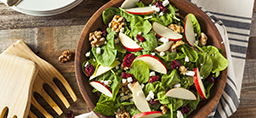
It’s a vicious cycle: Start a diet. Crave all the foods you cannot have. Fail. Feel guilty. Gain more weight. Start another diet.
According to Kristi Veltkamp, a dietitian at Spectrum Health, there’s good reason why diets don’t work.
“I cannot tell you how many people have said to me, ‘If I would just have been happy where I was before I started dieting,’” Veltkamp said. “Many people gain more weight with diets. There’s a constant desire there to lose the weight, but diets keep setting you up for failure.”
Thankfully, Veltkamp is here to help.
Here are her top 5 tips for how to lose weight … no dieting necessary:
1. Become more aware of when you are truly hungry and when you are full
“Most people don’t really listen to their bodies when they’re eating,” Veltkamp said.
There might be food in front of you, so you eat it all. Or you’re stressed or hurting, so you emotionally eat to distract yourself and cover the pain. Or you’re at a party where everyone’s eating, so you do, too.
She urges people to create a scale for their hunger, where 0 is starving and 10 is stuffed. You should eat at a 3—not too hungry and not too full.
Also, remember that hunger is a physical feeling. Try to focus on when you are truly hungry and when you want to eat for other reasons.
To be more aware of when you’re full, she urges slowing down and focusing on eating. It takes most people 20 minutes to recognize when their stomach is full.
Put your fork down between bites, sit down, reduce distractions (like television, driving or working) while eating. At home, put a small portion on your plate, and if you’re still hungry, go back for more.
At a restaurant, put half of your serving in a box right away, split a meal with someone, or simply divide your food on your plate to give yourself a stopping point to check in and see how full you are.
2. Create a distraction box or list of things to do besides eating
It’s tough to combat the urge to emotionally eat.
“When you’re not hungry, and you want to eat, food is a distraction from what you’re really feeling,” she said.
So Veltkamp suggests creating other distractions besides food. Figure out your most vulnerable place for eating when you’re not hungry. (For most people, it’s the room with your television).
In that room, keep a box with things you can do, or that will create a distraction, when you want to emotionally eat: nail polish, bubble wrap, knitting, crocheting, adult coloring books, Sudoku, crossword puzzles or journal.
3. Be realistic
Have a realistic view of eating and willpower. If you want a cookie, don’t deny yourself. Eat one, not 12. Or eat something special once a week, not every day. Enjoy it, and don’t feel guilty about it. If you fail and binge, forgive yourself and move on.
4. Plan ahead
Planning meals and surrounding yourself with healthy food sets you up for success. Veltkamp said if you have planned and shopped for meals and snacks, you’re less likely to run out and grab fast food or unhealthy comfort foods.
Do weekly food prep on the weekends so healthy meals are easy to throw together during your busy times. She recommends Pinterest or Yummly to find recipes.
Surround yourself with healthy snacks that combine protein and carbs, such as crackers and cheese, peanut butter, yogurt, trail mix, granola bars, string cheese, hard boiled eggs, or her personal favorite—dark chocolate covered almonds.
Also, she urges people to plan for troublesome scenarios like restaurants and social situations. Look up restaurant menus before you go to plan what you will order. Think about what you will eat at a party before you go. Pick one dessert you want the most and eat that—not everything.
5. Respect yourself
Respect, not accept, where you are. Veltkamp sees many people who keep bashing themselves and punishing themselves for failed diets. A healthy mindset can help lead the way to a healthy body.
“If you can start to respect yourself, you can give yourself more freedom to get on with the non-dieting approach,” she said. “Guilt and shame just leads to more over-eating.”
 /a>
/a>
 /a>
/a>
 /a>
/a>
Over time being healthy and eating processed/sugar-added foods cannot co-exist! Once in a while will not hurt, but every day, over time, those GMOs, artificial sweeteners pesticides and sugar adds up and will have damaging results on the body. Studies show sugar fuels cancer. Best to eat to live – whole, organic foods will heal your body and give you life.
Health full ideas. Thank you.
Very helpful and good ideas
Great Ideas… being kind to oneself is so important. The Body Achieves, what the Mind Believes. You did not put on the weight overnight — it will take some time to get rid of it! 🙂